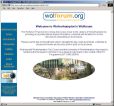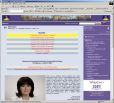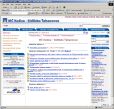Pilot applications
During the project, two pilot applications have been carried out by the project user partners - one in the United Kingdom (carried out by Wolwerhampton City Council (WCC) and one in Slovakia (joint effort of the Local Authority Kosice - City ward Tahanovce (LATA) and The Local Authority Kosice - City ward Dargovskych hrdinov (LAFU)). The pilot applications were divided into two phases (trials), in the Trial I individual modules of the WEBOCRAT system have been tested, and in the Trial II integrated versions of the system focusing on selected system functionality were tested by the user partners.
The pilot runs of our system were visible at the sites of our user partners.
You can visit their final installations of the system.
(sites are no more financed from the project)
 Wolverhampton City Council, UK Wolverhampton City Council, UK(www.wolverhampton.gov.uk) The Wolforum website was created through the project, but has now been superseded. Similar online discussions and opinion polls about local issues are now provided through the e-panel facilities on the Wolverhampton Partnership website. |
 The City ward Kosice - Dargovskych hrdinov (LAFU), Slovakia The City ward Kosice - Dargovskych hrdinov (LAFU), Slovakia(www.kosice-dh.sk) |
 The City ward Kosice - Sidlisko Tahanovce (LATA), Slovakia The City ward Kosice - Sidlisko Tahanovce (LATA), Slovakia(www.tahanovce.sk/mutah) |
Some of the first impacts observed by our user partners
- More Wolverhampton citizens are using Wolforum (787% increase in page requests and a 96% in pages served).
- WCC used WEBOCRAT to improve public participation in a democratic process by means of Wolverhampton Local Strategic Partnership (LSP). The LSP's objective is to produce a 10-year Community Plan which through consultation with citizens and stakeholders aims to improve the city and the public services offered by agencies in Wolverhampton.
- New types of communication flows emerged, e.g. mayor of LATA has got involved in communication with citizens, which was greatly appreciated by the citizens.
- LAFU introduced a new type of services delivered to local businesses and citizens - submission of requests, complaints with the possibility to track their processing status (using the Communication module). The service was well accepted.
